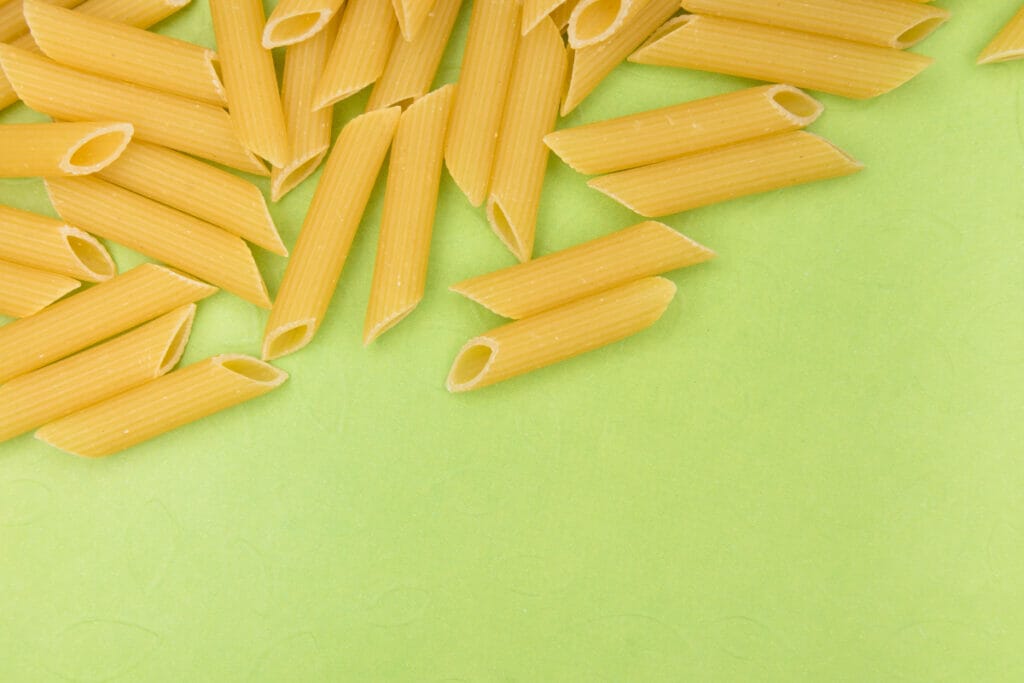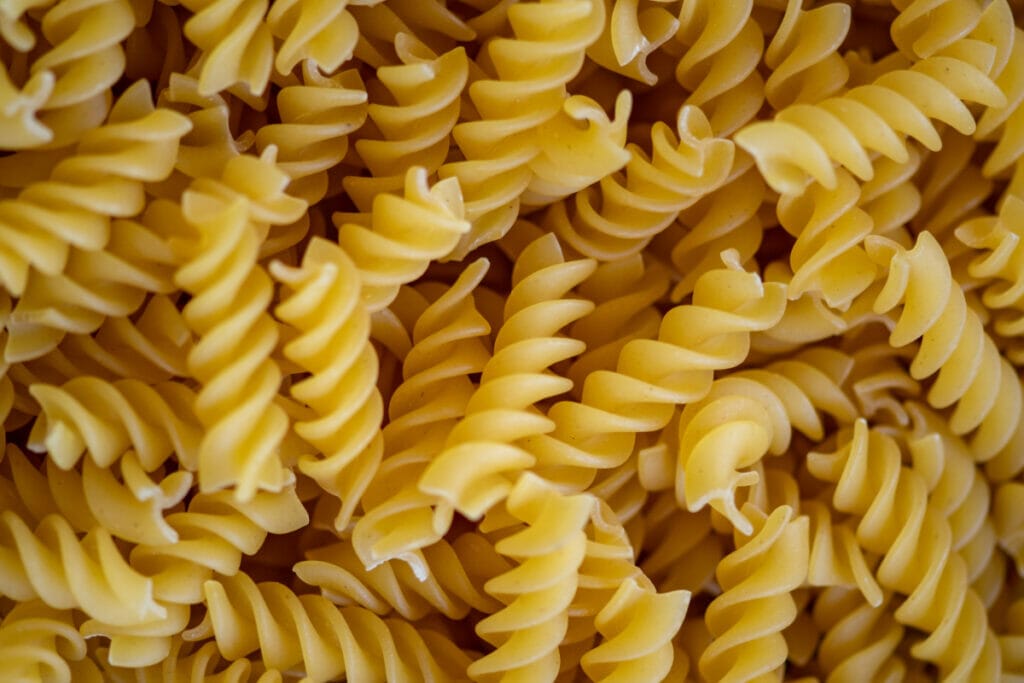Dry pasta is one of the truly great cooking ingredients for cooks who are cost-conscious. Even the pickiest eaters typically enjoy it because it is versatile, affordable, and healthy. Aside from those culinary virtues, its also durable. Dry pasta noodles can be kept for a long time in your pantry or cupboard with little special care. Although it doesn’t last forever, quality factors rather than food safety concerns are what limit how long it can be used.
Water and a particular kind of wheat known as durum are the only two ingredients used to make the majority of dry pasta. The majority of durum wheat, which is still grown and used extensively, is used to make pasta. It is combined to create a stiff dough, which is then extruded through a metal die to create a variety of shapes. Pasta that has been dried is as durable and hard as grains or beans. For flavor or color, some pasta recipes include eggs, spinach, tomatoes, squid ink, or other ingredients. When properly stored, these specialty noodles are just as durable as the plain variety.
Most brands of dry pasta have a “use-by” or “freshness date” stamped on the packaging. That is how long the pasta will maintain its flavor and nutrition, according to the manufacturer. These dates are typically conservative because manufacturers want you to continue purchasing their products on a regular basis. Most dried pastas are perfectly usable after two years on the shelf while still maintaining their best quality. Although their flavor and texture may deteriorate over time, the noodles are still safe to use unless they have been tainted in some way.
It’s important to use some common sense when working with pasta that’s old or of questionable age because pasta is resilient but not indestructible. You should discard the noodles if they are blotchy or discolored because they have likely been contaminated. The same is true if you discover insect egg cases, larvae, or insect eggs in the noodles. To test whether your pasta is still good and doesn’t smell musty, boil some water and cook a few noodles. Feel free to use them if their flavor and texture are satisfactory.
Using proper storage techniques, you can lengthen the shelf life of your pasta. Always store it in a cool, well-ventilated area because humidity and heat degrade the quality of pasta. Transferring your noodles to an airtight jar or storage container can help keep them usable for longer if you live in a particularly humid climate or if insects and other pests are a concern. Due to the natural oils in the grain, whole grain pasta can be more perishable than traditional pasta. Use whole-grain pasta within a few months or keep it well-wrapped in your freezer to prevent the oils from going rancid.
Fred Decker is a trained chef and prolific freelance writer. He was a longtime retailer who had previously sold mutual funds and insurance. He received his education at Northern Alberta Institute of Technology and Memorial University of Newfoundland. Numerous home and garden websites, such as GoneOutdoors, TheNest, and eHow, have published his articles.
Pasta Expiration Date
| Pantry | Refrigerator | Freezer | |
|---|---|---|---|
| Past Printed Date | Past Printed Date | Past Printed Date | |
| Dry Pasta lasts for | 1-2 Years | — | — |
| Dry Noodles last for | 1-2 Years | — | — |
| Fresh Pasta lasts for | — | 4-5 Days | 6-8 Months |
| Fresh Noodles last for | — | 4-5 Days | 6-8 Months |
| Cooked Pasta lasts for | — | 7 Days | 6-8 Months |
| Cooked Noodles last for | — | 7 Days | 6-8 Months |
Of course, if spaghetti, noodles, and macaroni are not stored properly, they last for a shorter amount of time. However, keep in mind that, like many other grains, noodles frequently have a “best before” date, which is simply the last day the manufacturer will guarantee the product’s safety and not an expiration date. This difference allows you to use pasta even after the best before date has passed.
GET A FREE NO-FUSS COOKBOOK & SECRET HACKS!
This is your downloadable, ad-free key to cooking success!
To be clear, we’re discussing dry pasta in this article rather than fresh or cooked pasta.
You could say that since dry pasta contains virtually no moisture, it never goes bad.

On Reddit, a debate is currently raging over how long dried pasta had been consumed after its “best by date,” and it was getting close to five years.
Don’t go crazy with the dried pasta; although we haven’t actually tried leaving it for like 50 years, the likelihood of you eating rancid pasta is extremely, extremely slim.
The pasta’s flavor and/or texture can degrade.
After many, many years, it is possible to end up with crumbly or “off”-tasting dried pasta, though it will take some time.
So, no, dried pasta doesn’t spoil in the traditional sense.
That’s why it’s so good as a pantry staple.
But don’t stock up now for a 10-year Italian dinner.

Water and a particular kind of wheat known as durum are the only two ingredients used to make the majority of dry pasta. The majority of durum wheat, which is still grown and used extensively, is used to make pasta. It is combined to create a stiff dough, which is then extruded through a metal die to create a variety of shapes. Pasta that has been dried is as durable and hard as grains or beans. For flavor or color, some pasta recipes include eggs, spinach, tomatoes, squid ink, or other ingredients. When properly stored, these specialty noodles are just as durable as the plain variety.
It’s important to use some common sense when working with pasta that’s old or of questionable age because pasta is resilient but not indestructible. You should discard the noodles if they are blotchy or discolored because they have likely been contaminated. The same is true if you discover insect egg cases, larvae, or insect eggs in the noodles. To test whether your pasta is still good and doesn’t smell musty, boil some water and cook a few noodles. Feel free to use them if their flavor and texture are satisfactory.
Fred Decker is a trained chef and prolific freelance writer. He was a longtime retailer who had previously sold mutual funds and insurance. He received his education at Northern Alberta Institute of Technology and Memorial University of Newfoundland. Numerous home and garden websites, such as GoneOutdoors, TheNest, and eHow, have published his articles.
Most brands of dry pasta have a “use-by” or “freshness date” stamped on the packaging. That is how long the pasta will maintain its flavor and nutrition, according to the manufacturer. These dates are typically conservative because manufacturers want you to continue purchasing their products on a regular basis. Most dried pastas are perfectly usable after two years on the shelf while still maintaining their best quality. Although their flavor and texture may deteriorate over time, the noodles are still safe to use unless they have been tainted in some way.
Dry pasta is one of the truly great cooking ingredients for cooks who are cost-conscious. Even the pickiest eaters typically enjoy it because it is versatile, affordable, and healthy. Aside from those culinary virtues, its also durable. Dry pasta noodles can be kept for a long time in your pantry or cupboard with little special care. Although it doesn’t last forever, quality factors rather than food safety concerns are what limit how long it can be used.
FAQ
How do you know if noodles have gone bad?
Pasta that has become slimy or gooey, which typically takes place just before visible mold starts to grow, is one of the most obvious signs that it has gone bad. It may also appear dull or discolored, perhaps with a grayish or whitish tint.
Do dried egg noodles expire?
A package of dry egg noodles will typically remain in top condition when properly stored for about two years at room temperature. Keep the package of dry egg noodles tightly closed at all times to extend shelf life.
Is expired dried pasta safe to eat?
The quality of taste or texture may start to change after the expiration date, but technically, dried pasta can be consumed after it has gone bad. A box of pasta typically has a shelf life of one to two years.
How long can you keep expired noodles?
After three months after their expiration date, ramen noodles are still safe to eat, but it’s best to discard them as mold growth will start to appear. You are more likely to experience an upset stomach after consuming ramen the older it gets.